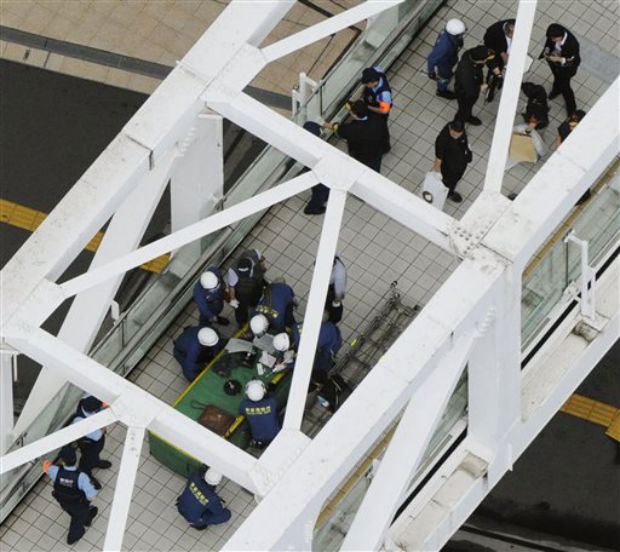Man sets self afire in Tokyo in apparent protest

Investigators and firefighters work at the scene where a man has set himself on fire, on a pedestrian walkway at Tokyo’s busy Shinjuku railway station, Sunday, June 29, 2014. A man set himself on fire at the station on Sunday in an apparent political protest. The man, who appeared in his 50s or 60s, was taken to the hospital after suffering serious injuries, said an officer at the Shinjuku police station. He said the reason for the self-immolation was under investigation. AP
TOKYO — A man set himself on fire at Tokyo’s busy Shinjuku railway station on Sunday in what appears to be a rare violent political protest.
The man, who appeared in his 50s or 60s, was taken to the hospital after suffering serious injuries, said Daiji Kubota, an officer at the Shinjuku police station. He said the man’s identity and the reason for the self-immolation was under investigation.
Footage of the incident on Twitter and other social media showed a man clad in a suit and tie sitting on a small mat along the metal framework above a pedestrian walkway with two plastic bottles of what looked like gasoline beside him.
Witnesses were quoted as saying the man spoke through a megaphone to protest the government’s moves to change Japan’s defense policy, doused himself with gasoline and set himself alight as hundreds of people watched from below and from nearby buildings.
Television reports showed firefighters pulling the man down onto the pedestrian bridge walkway and using hoses and a fire extinguisher to put out the fire before loading the victim into an ambulance.
Article continues after this advertisementJapan’s Cabinet is expected on Tuesday to approve a proposal calling for the right to “collective self-defense,” which would allow Japan to play a more assertive role in international security amid China’s growing military presence and rising regional tensions. Japan currently limits its participation even in UN peacekeeping activities to noncombat roles.
Article continues after this advertisementCritics say the shift undermines the war-renouncing Article 9 of Japan’s Constitution, and opposition groups have staged constant but peaceful protests outside Prime Minister Shinzo Abe’s official residence.
Japan has had very few self-immolations in past decades despite a long history of suicides by ritual disembowelment, or seppuku, dating back to the feudal era. The most high-profile suicide for political reasons in the modern era was by Yukio Mishima, a right-wing author considered to be one of Japan’s greatest novelists, who killed himself in front of the headquarters of Japan’s Self Defense Forces in 1970 after an unsuccessful coup attempt.